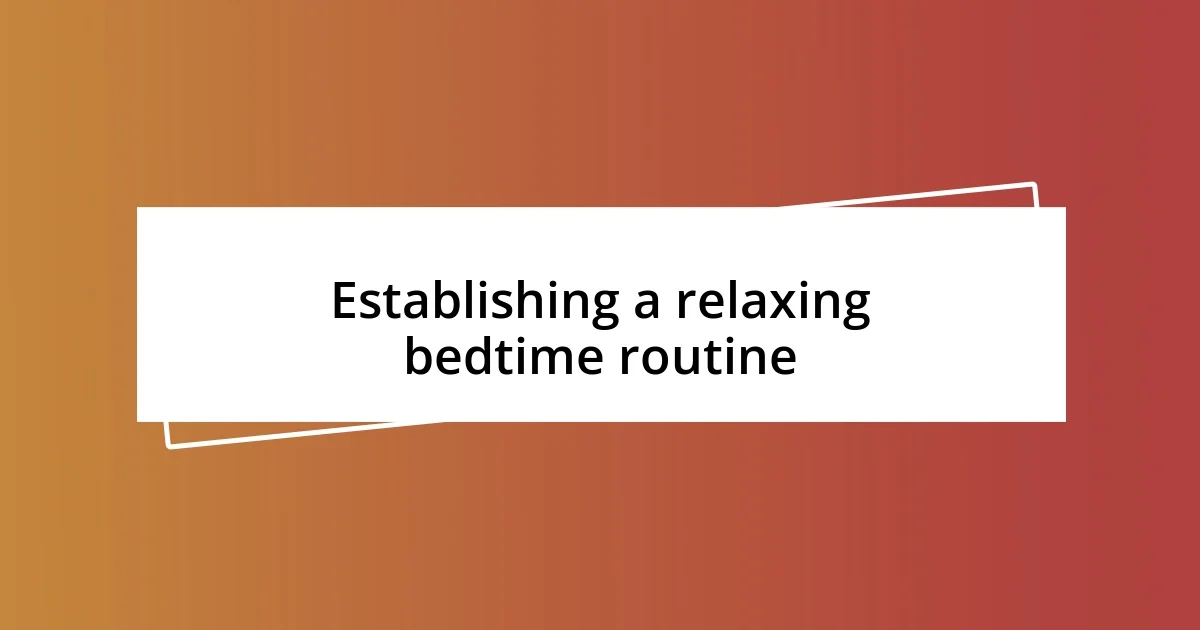Key takeaways:
- Establishing a consistent sleep schedule regulates the body’s internal clock, leading to improved sleep quality and mood.
- Creating a calming bedtime routine with soothing activities, like reading or gentle stretching, signals the body to prepare for sleep.
- Limiting screen time before bed prevents interference with melatonin production, enhancing sleep quality and making mornings more vibrant.

Understanding sleep hygiene principles
Understanding sleep hygiene principles is essential for anyone eager to enhance their sleep quality. I remember a time when my sleep routine was chaotic; I would often scroll through my phone before bed, thinking, “Just five more minutes.” This habit was detrimental, and it took a toll on my energy the next day. Sleep hygiene emphasizes the importance of a consistent sleep schedule and a restful environment—principles I’ve come to rely on.
The concept of creating a serene sleep environment can’t be overstated. I once transformed my bedroom into a calming sanctuary by minimizing clutter and using soft lighting. It made a remarkable difference! Have you ever noticed how a dark, quiet room can feel like a hug for the mind, encouraging relaxation? Sleep hygiene encompasses factors like reducing noise, keeping the room cool, and even opting for comfortable bedding—all aimed at promoting restful sleep.
Another fundamental principle revolves around the activities we engage in before bedtime. I’ve found that winding down with a good book or some gentle stretches works wonders compared to binge-watching TV. This shift raised the question in my mind: how do our pre-sleep habits impact our sleep quality? I realized they set the tone for our rest, making it crucial to choose soothing, calming rituals.

Creating a consistent sleep schedule
Creating a consistent sleep schedule can drastically enhance your overall sleep quality. I’ve experienced firsthand how sticking to a regular bedtime and wake-up time can help regulate my body’s internal clock. There were nights when I’d stay up late and sleep in, thinking it wouldn’t affect me. Those mornings were a struggle, reminding me of the value consistency brings to each day.
When I committed to a sleep schedule, I began each day feeling refreshed. I often recommend slowly adjusting your bedtime if it feels daunting; even shifting it by 15 minutes can make a difference. Have you noticed how your mood improves after a solid night’s sleep? I find that maintaining this rhythm fosters not just sleep quality but also a clearer mind and better emotional balance.
Now, it’s important to remember that life can throw curveballs. I occasionally face late-night events or unexpected interruptions. During those times, I do my best to adjust my bedtime on the following night to stay as close to my routine as possible. Your body thrives on predictability, and I’ve learned that even minor adjustments can make a huge impact over time.
| Benefits of a Consistent Sleep Schedule | Irregular Sleep Patterns |
|---|---|
| Improved Sleep Quality | Difficulty Falling Asleep |
| Enhanced Mood | Increased Fatigue |
| Better Focus and Productivity | Poor Concentration |

Establishing a relaxing bedtime routine
Establishing a relaxing bedtime routine has been a game-changer for me. When I made a conscious effort to incorporate peaceful activities before bed, I noticed an immediate improvement in my ability to unwind. For instance, I now dedicate the last half-hour of my day to soothing rituals like sipping herbal tea or doing a guided meditation. It’s incredible how these small changes can signal my body that it’s time to transition into sleep mode.
Here are some activities that I’ve found particularly effective for creating a calming bedtime routine:
- Dim the lights: Lowering the light levels helps cue my body for sleep. I often opt for soft lamps instead of overhead lighting.
- Read a calming book: Delving into a good story transports me to a different world, allowing my mind to drift away from daily stressors.
- Gentle stretches or yoga: I practice some light stretching to release tension in my muscles, which feels incredibly soothing.
- Listen to calming music or nature sounds: Soft melodies or ambient sounds have a magical way of promoting relaxation.
- Establish a technology curfew: Setting aside my phone and other screens at least 30 minutes before bed significantly reduces distractions and promotes better sleep quality.
Incorporating these elements has transformed my nights into a mindful ritual that signals it’s time to rest, improving both the quality of my sleep and my overall well-being.

Optimizing your sleep environment
Creating the right sleep environment is essential for promoting quality rest. I’ve found that keeping my bedroom cool, ideally between 60-67°F (15-19°C), makes a world of difference. Sometimes, I even notice how a slight drop in temperature can help me fall asleep faster and stay asleep longer. Have you ever woken up feeling too hot or too cold? It’s uncomfortable, isn’t it?
Alongside temperature, the darkness in my room significantly affects my sleep quality. Blackout curtains have become my best friends. I remember the first time I installed them; it was like stepping into a cave, and I was amazed at how quickly I drifted off without the disturbance of outside light. I also use an eye mask on particularly bright nights and even add earplugs if noise becomes an issue. Creating that serene atmosphere makes me feel cocooned and ready for rest.
Finally, I’ve discovered that keeping my sleep space clutter-free contributes to a peace of mind that enhances my sleep. When my bedroom is tidy and organized, it feels more inviting, almost like a sanctuary. I’ve made it a habit to declutter my space regularly. It sounds simple, but that small effort has helped foster a calming environment, allowing me to slip into slumber without a racing mind. Wouldn’t you agree that a serene space can truly set the tone for a restorative night?

Managing diet and exercise habits
Managing my diet and exercise habits has been a pivotal part of enhancing my sleep hygiene. I’ve noticed that what I eat during the day has a direct impact on how well I sleep at night. For instance, when I indulge in a heavy meal right before bed, I often find myself tossing and turning, regretting that extra slice of cake. Have you ever experienced that uncomfortable feeling of trying to sleep after a late dinner? I’ve learned that lighter meals several hours before bedtime are so much more beneficial.
Exercise plays a crucial role in my sleep patterns, too. I’ve found that engaging in regular physical activity, especially earlier in the day, helps me feel more energized and ready for sleep at night. On days when I go for a brisk walk or hit the gym, I tend to fall asleep faster and wake up feeling refreshed. Have you ever noticed how a good workout can make a difference in your sleep quality? It’s almost like my body craves that release of energy, allowing me to rest more deeply.
I also pay attention to the timing of my caffeine intake. I used to enjoy that afternoon coffee boost, but I realized it was keeping me awake when I didn’t want to be. Now, I consciously avoid caffeine after mid-afternoon and choose herbal teas instead. This simple shift has made a significant difference in my ability to wind down by bedtime. Being mindful about what I consume throughout the day has not only improved my sleep but also how I feel overall. Isn’t it fascinating how our daily choices can ripple into something as vital as rest?

Limiting screen time before bed
Limiting screen time before bed has been one of the most effective strategies I’ve implemented to enhance my sleep hygiene. I used to scroll through my phone until I couldn’t keep my eyes open, thinking it was harmless. But, I quickly learned that the blue light emitted from screens can interfere with our natural sleep-wake cycle by blocking melatonin—our sleep hormone. Have you ever found yourself staring at your screen, only to realize time has flown by?
Now, I set a strict cutoff time for screens at least an hour before I head to bed. I remember the first night I switched off all devices early; it felt strange at first. However, I soon discovered the calming effects that a good book or soft music could bring instead. The quiet moments were refreshing, allowing my mind to unwind rather than overstimulating it. What a revelation it was when I noticed how much easier it was to fall asleep without that constant barrage of notifications and bright screens.
There are times I still struggle with the urge to check my devices, especially if something exciting is happening online. However, I remind myself that those moments can wait until morning. It’s funny how losing track of time can feel so normal, but stepping away from screens has not only improved my sleep quality—it has made my mornings feel so much more vibrant and alert. Have you tried limiting your screen time before bed? The results might surprise you!













